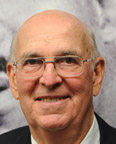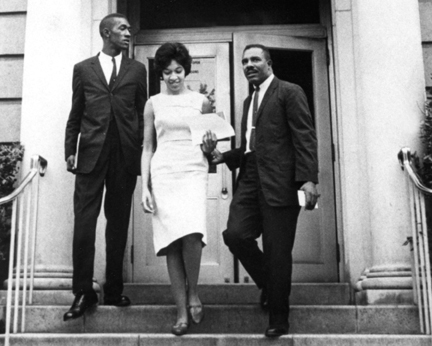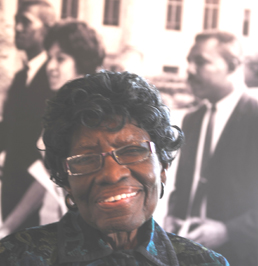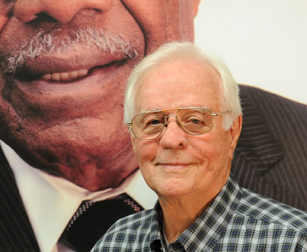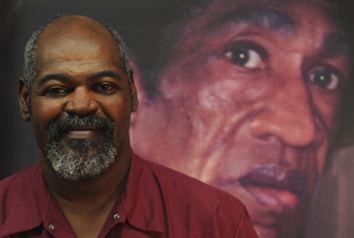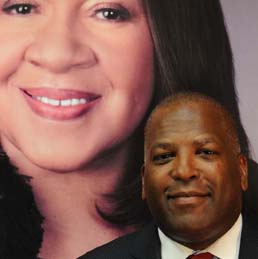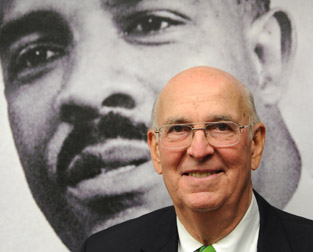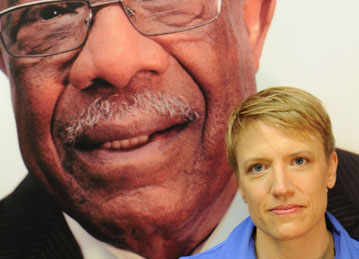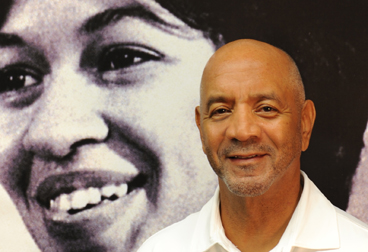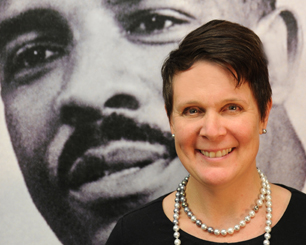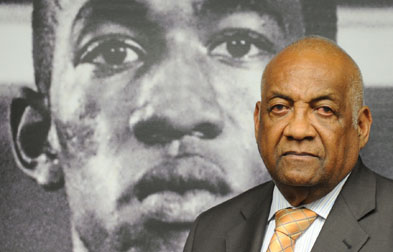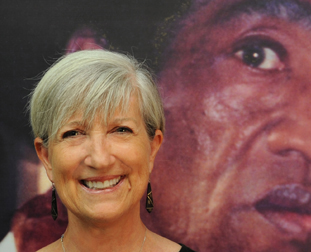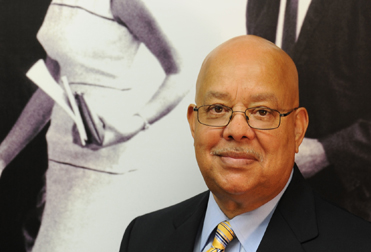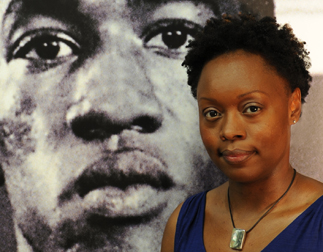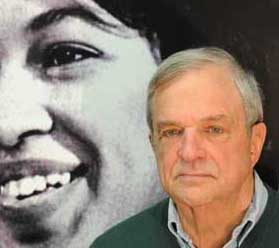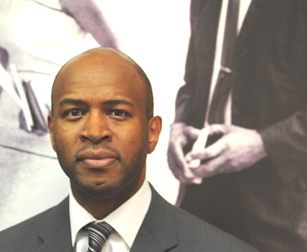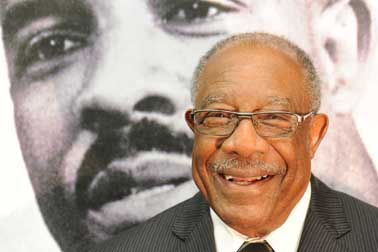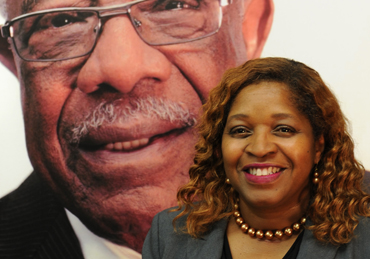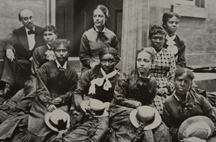

1963-2013: Desegregation—Integration Reflections |
||||||||||||||||||||||||||||||
|
||||||||||||||||||||||||||||||
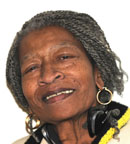 “We must treat all of our students as our equals. Let them know from the outset that there will be no exceptions based on race, creed, or color.” Patricia Smith Lewis |
||||||||||||||||||||||||||||||
|
||||||||||||||||||||||||||||||
|
||||||||||||||||||||||||||||||
“If you wish to become a teacher, then you really must be a compassionate person who truly likes people. And you must know that if you take the right and courageous stand, there may be some uneasy moments from time to time. But if you are standing for the right issues and doing the right thing, there will always be a place for you as a teacher. You may not be able to change the world, but you will have an impact on those with whom you come into contact. You might get in trouble with the people upstairs, but keep pushing forward the big issues.” Bill Dufford |
||||||||||||||||||||||||||||||
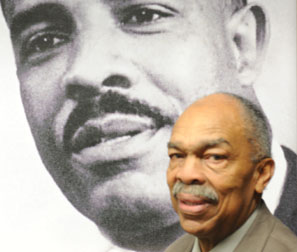 “Learn all you can about the history of this state if you wish to be a teacher here. While you need not be a historian, you do need to know about the past in order to chart the future.” James L. Felder |
||||||||||||||||||||||||||||||
“Be very patient and cautious. These kids are so sophisticated and can read your mind. They know when you are honest and telling the truth, and they know when you are not. Your role is to develop an image that lets them know that you can be trusted. These young people are looking for adults that they can trust. Every day is a challenge as you become that teacher who is honest and truthful. You can develop trust, but be careful—it is so easy to lose.” Willie Ashford, Jr. |
||||||||||||||||||||||||||||||
“The profession of education is a calling, and students who choose to go into this field know that it is one of the most consequential jobs in any democracy. If in fact this nation is going to be what we wish, then teachers have an even greater role today than in times past. Today’s children in both urban and rural environments are faced with many of the same challenges as those of 50 years ago—from lack of resources to lack of familial and social support. Thus, today’s teachers must be prepared to be excellent educators, prepared at times to be social workers, prepared to be mentors, and prepared to be listeners. They must come into this position knowing that it must be a true calling. And in many respects they will be the very last line of defense for these children.” Steve Benjamin |
||||||||||||||||||||||||||||||
“Teachers need to vote and be politically active. This is not now the case for a shocking proportion of South Carolina teachers. Caring about their students requires teachers to be active citizens who express their views about statewide educational issues that directly impact their students’ opportunities to learn. Teachers know more about their students’ needs than anyone other than the students’ parents, and it is the responsibility of teachers to forcefully and persistently share their insights with policymakers, as well as with the public.” Hayes Mizell |
||||||||||||||||||||||||||||||
“Many public schools are segregated. South Carolina’s public schools are ‘majority minority’ schools. It is imperative that we build coalitions of teachers, community members, and students across these segregated contexts who want to study history, talk about race, understand institutional racism and white privilege, and continually rethink their teaching and learning practices in order to build the kind of world where people are committed to a greater good, to educational opportunities that change lives and disrupt deficit perspectives.” Tasha Tropp Laman |
||||||||||||||||||||||||||||||
“Prepare yourself. It will be difficult for you to simultaneously become a subject matter expert while also fighting for social justice in the schools. You must prepare yourself with the history of what you are going to fight, and you must be aware of the struggles of those who have gone before you. Know who you are and know what it is that you wish to accomplish, and understand what has changed and what needs to change. Develop a theory about this and determine a way to measure your efforts as you try to initiate change. Be focused and passionate about social justice and have an idea of the legacy that you want to leave.” Harry L. Walker |
||||||||||||||||||||||||||||||
“Martin Luther King asserted, ‘All labor that uplifts humanity has dignity and importance and should be undertaken with painstaking excellence.’ Teaching for justice and equitable integration is not easy work; it is difficult and complex but it is worth doing. Remember that even though it is a complicated world, with difficult issues to address, you can take a stand. Also keep in mind that schooling can be a force used to assimilate and dominate or it can be, as Paulo Freire asserts, ‘the means by which men and women deal critically and creatively with reality and discover how to participate in the transformation of their world.’ Always work for education for and towards freedom.” Beth Powers Costello |
||||||||||||||||||||||||||||||
|
||||||||||||||||||||||||||||||
“Feel pride that the very nature of your profession calls you to challenge injustices. Engage families, communities, and colleagues in identifying and addressing injustices often so embedded in the day-to-day life of schools and classrooms, programs and practices that they are difficult to recognize by those who benefit from them. Broaden curricula beyond a focus on whiteness so that each student’s community, history, and heritage are known for rich contributions to the world’s beauty and brilliance, a critical step in interrupting racial hierarchies. Find strength in your convictions as you take action for real change.” Susi Long |
||||||||||||||||||||||||||||||
“I want to commend these individuals who wish to become teachers. They have an important role—to help their students, especially African American children, to develop a positive self-image. These children need to know that they have value and that they must not be influenced by the negative images that they see, on a daily basis, on the 6 o’clock news. These teachers must also help their students audit their lives and realize that there will be assets and liabilities throughout life. There is no perfect person and, as a result, young people need to be taught that life will be like a roller coaster—there will be ups and downs and students cannot let their mistakes or disappointments define them.” I. S. Leevy Johnson |
||||||||||||||||||||||||||||||
“During the course of a meeting focused on a high stakes testing program and its impact on the most vulnerable students, a parent shared with me that ‘My child is not their dress rehearsal.’ Parents have entrusted their most precious asset to you—their children. No matter the age of our students, we have a sacred trust to teach them at the highest possible level. Each and every child deserves an engaging and intellectually rich curriculum that affirms who they are and that they can (and are expected) to contribute to their communities. Remember that as teachers, we are a part of a legacy of people who struggled and organized to make sure that democracy is an action word and not mere description.” Daniella Ann Cook |
||||||||||||||||||||||||||||||
|
||||||||||||||||||||||||||||||
“I salute anyone who commits themselves to teaching in our classrooms. Transforming young minds is one of the greatest responsibilities that anyone can have. Our schools need teachers who are willing to go the extra mile for every child in their classroom. To be sure, those who are motivated to teach and who work for social justice will find challenges every day. Your energy, creativity, and commitment will be tested. Despite the obstacles, teachers must be vigilant and not lose sight of the dreams and passions that guided them into the profession. Teachers must find those pathways where they can maintain their passion, their creativity, and their commitment to justice and still enjoy the job of teaching. In short, keep on pushing and believing that your voice and your efforts will make a difference in the lives of your students and the world around them.” Bobby Donaldson |
||||||||||||||||||||||||||||||
“I will answer this question in two ways: First if that person is black, I would say that you have a responsibility to try to ensure that you give your very best to every student that you encounter—whether they have had a bath the day before or not, whether they come from an impoverished neighborhood or not, whether they have been taught respect or not, and whether they are ready to learn or not. This is especially important in the elementary schools—this is where children are saved or destroyed, where their minds become stimulated or closed. Elementary school teachers have an obligation to expect and nurture the best out of every child and not be influenced by any biases or the attitudes of parents who appear resentful. As a teacher your responsibility is to draw the best out of children that is in them. And in order to do this you must communicate that you care. Children can sense when teachers do not care. They do not have to be told. If you are not truly committed to loving and nurturing every child that is put under your care, then you do not want to be a teacher. If the person is white, I would say all of the above, AND add that you must be especially mindful with respect to your black students. These children often come from a different environment than yours. They need to be nurtured.” James L. Solomon, Jr. |
||||||||||||||||||||||||||||||
“Enroll in some of the wonderful courses in the College of Education which focus on teaching for social justice and equity. One caveat is that because teaching for equity goes against the status quo, the process can cause much discomfort for educators as they learn about individual and institutional acts of oppression and the corresponding implications for their instruction, curricula, and assessment. (I hear this often from educators from all ethnic backgrounds). It helps to collaborate with others who are making similar efforts and to identify model teachers who are effectively teaching for social justice. Many minoritized children suffer daily in school—academically, socially, and psychologically. So while the process of becoming a teacher for social justice goes against the convention, it must be done on behalf of the children.” Gloria Boutte-Johnson |
||||||||||||||||||||||||||||||
![]()

an institutional member of the International Coalition of Sites of Conscience
Museumofed@gmail.com

